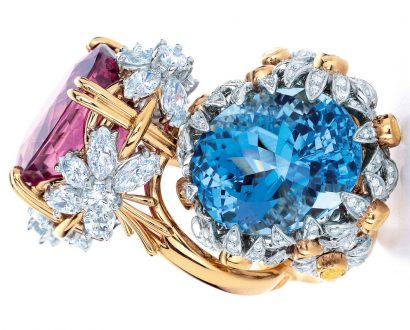Priceless luxury: Why Chopard, Gucci and Versace are going green

In the past few years, major jewellery maisons, alongside big luxury brands, have committed to more sustainable practices, giving to charitable and philanthropic causes, and transforming their businesses to be more transparent and ethical.
Last year, we saw Tiffany & Co. donate A$1.4 million (US$1 million) to the Great Barrier Reef as part of its ongoing commitment to coral and reef conservation, as well as enter a new era of transparency by sharing with consumers the provenance of its precious stones with the industry-first Tiffany’s Diamond Source Initiative.
The likes of Gucci and Versace have banned fur in their designs and Richemont’s luxury watch brand Baume & Mercier launched its new, affordable brand, Baume, which uses recycled, upcycled and sustainable materials in its designs and steers clear of mined precious gems and metals.
Swiss jewellery house Chopard has committed to 100% ethical gold in its watch and jewellery creations. Chopard Co-President Caroline Scheufele made the announcement at the 2018 Baselworld watch and jewellery fair, saying "True luxury comes only when you know the handprint of your supply chain and I am very proud of our gold-sourcing program.
"Gold and gems are not solely a source of happiness: people and the environment can suffer from the consequences of mining and gold refining when these are undertaken irresponsibly."
All these moves fit with what influential fashion industry website The Business of Fashion (BoF) says is a major trend in its 2019 ‘State of Fashion’ industry report. That is, brands are becoming serious about sustainability, traceability and social justice. In other words, luxury is getting ‘woke’.
What’s more, not doing so could put your brand at risk of becoming irrelevant in the future. As BoF noted, "Younger generations’ passion for social and environmental causes has reached critical mass, causing brands to become more fundamentally purpose driven to attract both consumers and talent."
According to recent research from Nielsen, 73% of millennials are willing to pay more for sustainable goods, a stance that has particular significance given investment bank UBS predicts millennials are set to control as much as US$31 trillion by 2020.
Meanwhile, in March, more than one million students around the world walked out of school to protest climate change with more than 2,000 protests held in 125 countries. The Kids are Alright, as the American television series said, and one day they might want to buy a diamond engagement ring or a watch that aligns with their core values.
Derek Blasberg, head of the fashion and beauty partnerships division at YouTube believes increased consumer consciousness around sustainability has changed the very idea of luxury. In a recent interview for Self Service Magazine, Blasberg commented on this change in attitude saying,
"Today climate change is undeniable and we’re opening our minds to things like man-made leather and ethically sourced textiles. In fashion that means the idea of luxury has evolved.
"I used to covet things that were exclusive and expensive. Don’t get me wrong: I still want that now, but I also have to know that what I’m consuming isn’t harming the planet. For me, modern luxury is the peace of mind that I’m not f-cking up this world for the next generation."
Anisa Kamadoli Costa, Chairman and President of The Tiffany & Co. Foundation (founded in 2000) is similarly passionate about ensuring the world is left in a good place.
Kamadoli Costa visited Sydney in November 2018 to participate in an ‘In-conversation’ event on coral conservation.
In addition to the jeweller’s donation to the Great Barrier Reef Foundation it also launched the Out of the Blue Box Challenge with the Great Barrier Reef Foundation, a global call for new ideas from fields including science and finance to help ensure the Reef’s future. The winner received a prize of A$300,000 (US$225,000) to realise their idea.
"We believe there is reason for hope," said Kamadoli Costa of the partnership. "The Foundation is proud to support two of the leading organisations working to preserve the Great Barrier Reef, one of our planet’s most significant natural assets.
Together, we can find novel solutions to preserve this precious coral ecosystem and ensure that it is vibrant and healthy for generations to come."
In many ways, it makes sense for the luxury industry to be at the forefront of sustainability. It doesn’t just make for good business in the current socially conscious climate, but luxury goods should be inherently sustainable. Because of the craftsmanship that goes into them and the materials used (if sourced responsibly) and because much of what the luxury industry creates is intended to last.
Elisa Niemtzow, Managing Director of global not-for-profit organisation Business for Social Responsibility (BSR), believes there is a great opportunity for luxury brands to be leaders in sustainability.
As part of its Responsible Luxury Initiative last year, BSR outlined three ways luxury brands can embrace sustainability: engaging in new ways of regeneration and expanding product life cycles; promoting cultural change and philanthropic practices within business and ensuring fair wages and conditions; and engaging with consumers on a new value proposition for luxury – transparent, vertically integrated (meaning luxury brands have full vision and ownership of their supply chain) and meaningful.
As for whether a value can be put on preserving the environment and the future of the planet for future generations, well, that remains to be seen. Though really, the sparkle factor of luxury jewellery brands doing good is surely priceless.